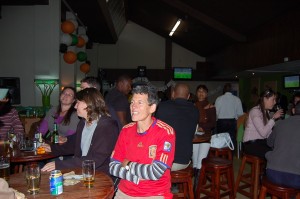England/Germany game wasn’t a nail biter
Tuesday, June 29th, 2010 by Taurai Maduna
Kubatana.net ~ an online community of Zimbabwean activists
The French football team didn’t do too well but France should get a big pom pom for this initiative:
Reporters Without Borders unveils first “Anti-Censorship Shelter”
Reporters Without Borders today launched the world’s first “Anti-Censorship Shelter” in Paris for use by foreign journalists, bloggers and dissidents who are refugees or just passing through as a place where they can learn how to circumvent Internet censorship, protect their electronic communications and maintain their anonymity online.
“At a time when online filtering and surveillance is becoming more and more widespread, we are making an active commitment to an Internet that is unrestricted and accessible to all by providing the victims of censorship with the means of protecting their online information,” Reporters Without Borders said.
“Never before have there been so many netizens in prison in countries such as China, Vietnam and Iran for expressing their views freely online,” the press freedom organisation added. “Anonymity is becoming more and more important for those who handle sensitive data.”
Reporters Without Borders and the communications security firm XeroBank have formed a partnership in order to make high-speed anonymity services, including encrypted email and web access, available free of charge to those who user the Shelter.
By connecting to XeroBank through a Virtual Private Network (VPN), their traffic is routed across its gigabit backbone network and passes from country to country mixed with tens of thousands of other users, creating a virtually untraceable high-speed anonymity network.
This network will be available not only to users of the Shelter in Paris but also to their contacts anywhere in the world and to all those – above all journalists, bloggers and human rights activists – who have been identified by Reporters Without Borders. They will be able to connect with the XeroBank service by means of access codes and secured, ready-to-use USB flash drives that can be provided on request.
XeroBank is a communications security firm that has cornered the market on one of the rarest commodities in the world: online privacy. It specializes in communication solutions that protect its clients from all eavesdroppers.
The best-known free encryption and censorship circumvention software is also available to users of the Shelter, along with manuals and Wiki entries on these issues. A multimedia space is planned for journalists and Internet users who want to film and send videos.
The Shelter will eventually also have a dedicated website for hosting banned content. Egyptian blogger Tamer Mabrouk’s reports on the pollution of Egypt’s lakes, which are banned in his country, and articles that are banned in Italy by its new phone-tap law will all have a place in what is intended to be a refuge for those who still being censored.
The Shelter is open from 10 a.m. to 6 p.m. Monday to Friday. Anyone wanting to use it should make a reservation by sending an email to shelter (@) rsf (dot) org
The Shelter could not have been created without the support of the Paris city hall.
Reporters Without Borders points out that around 60 countries are currently subject to some form of online censorship and that Internet filtering is in effect in around 40 of them. About 120 netizens (bloggers, Internet users, and citizen journalists) are currently in prison worldwide.

Some of us went to watch the Brasil/Portugal game at Fusions Cafe/Bar at the race course last week. Dig yourselves out of your homes and go out and support Zimbabwean businesses who are doing wonders to create a convivial atmosphere to enjoy the World Cup.
I haven’t checked the maths but here’s something interesting sent in to us from a subscriber:
AFRICA
Robert Mugabe (Zimbabwe) age 86
Hosni Mubarak (Egypt) age 82
Hifikepunye Pohamba (Namibia) age 74
Rupiah Banda (Zambia) age 73
Mwai Kibaki (Kenya) age 71
Colonel Gaddafi (Libya) age 68
Jacob Zuma (South Africa) age 68
Ian Khama (Botswana) age 57
______________________________Average: 72.4
______________________________THE FIRST WORLD
Barrack Obama (USA) age 48
David Cameron (UK) age 43
Dimitri Medvedev (Russia) age 45
Stephen Harper (Canada) age 51
Kevin Rudd (Australia) age 53
Nicolas Sarkozy (France) age 55
Luis Zapatero (Spain) age 49
Jose Socrates (Portugal) age 53
______________________________Average: 49.6
______________________________DIFFERENCE: 22.8
I went to get my hair done yesterday, nothing fancy, just cornrows to get through the rest of the winter. Not being patient I knew that sitting in the hairdresser’s chair for close to three hours wouldn’t be easy. But I felt that the end justified the wait and the pain of having someone tugging at my scalp. I wanted a change. As I sat, watching the chaotic black-brown bush on my head become tame and transform into something new and orderly, it occurred to me that change is gradual, and sometimes painful. As much as I wished it were, change can never be an event, it is a process.
We are in the process of change. It’s difficult to tell what kind of change from one day to the next, or even if there is progression, particularly when sitting in the dark with a half cooked meal during winter. But there has been change.
The signing of the GPA was met with much jubilation, celebration and most importantly hope. It restored many Zimbabweans faith in their country and to some extent their leaders. Suddenly there was talk of a working economy, and things like democracy and rule of law returning to Zimbabwe. At the time, that hope was essential, but the faith was misplaced. The GNU was not meant to be the event at the end of the process: it is the process itself. The Inclusive Government isn’t everything: it is not efficient, it is not incorrupt, it is not a democratic dispensation, and it is not a perfect solution.
But it is a solution. Almost two years after the GPA has been signed, we are very articulate about what the Inclusive Government is not, and what it has failed to do. A survey taken by the Research and Advocacy Unit late last year posed the question ‘Do you feel that the GNU has improved your life?’
Significantly most people answered no.
Perhaps the entire perspective on the GNU and its purpose is wrong. It was never meant to be a lasting solution to a problem that took several decades to create. It was supposed to be a vehicle for change. Not just political change, but also change within ourselves. This change is indeed slow, and often painful. Never the less it is a change.